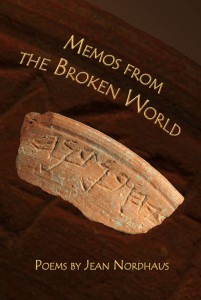
Poetry. Paper, Perfect Bound. 80 pages
2016, ISBN: 978-1-936419-56-2 $15.95 & S+H
Note: You don’t have to have a PayPal account in order to use the PayPal button, just a credit card.
Taking her title from the kabbalist creation tale of the clay vessels that had to break so God’s light could scatter through the universe, Nordhaus mourns and celebrates a world that comes into being through continuous acts of breakage. She recalls a child who would eat nothing broken, a kewpie doll with a crack that “spidered across his plaster skull” with blackness trickling from “the hollow place inside,” conjures a spark of light that “splashed into the teacup of a skinny Jew named Kafka,” and details the clash between religious and ethnic longings and the realities of violent conflict in a sequence of poems set in Israel and the West Bank. Ranging over time and continents, the poems in Memos from the Broken World, tell of our longing for the perfection of “snow in the morning / before any footstep has broken the crust” and of the various strategies we humans devise, as we pursue happiness in an imperfect world.
Praise for Jean Nordhaus’s work:
“Time eats everything up,” writes Jean Nordhaus, and that includes our griefs as well as our joys. Her poems in Memos from the Broken World stand as antidotes to Time’s thoughtless erasures, reminding us – for what else is a memo but a reminder? – that the world is broken so that it may continue. Home and homelessness, exile and restoration, childhood and parenthood, the range of subjects among these short, perfect lyrics is breathtaking. These are poems in praise of the continuities of living. — Mark Jarman, author of Bone Fires: New and Selected Poems
Though these poems can’t mend our broken world, they can surely illuminate it for us with their wisdom and craft. Jean Nordhaus is a poet of keen intelligence, her language spare but resonant. This new book offers many pleasures and should earn for its author the large readership she has long deserved. — Linda Pastan
Remnants from the broken world gathered from the ancient distance– “God’s light/ fled to all the corners of the world,” come to rest in Kafka’s teacup—incongruous, unexpected journeys these poems make.
And unlike any other poetry collection I know, these remnants resurface, carrying their earlier threads, hauntingly resonant in their next incarnation. We have testimony from those who leaped, those who washed up on shore, the one who carries his childhood in a shoebox, but when he opens it can only arrange his soldiers for war. Or from the arrow: “the keening of the cleft air as you pass,” “the wound of arrival.”
And, in a powerful group of poems –“On the Road to Qumran” from desert to cave, ancient scrolls to Dead Sea, from beginnings—a baby in a soldier’s arms–to the unlikely and painful reality of the present, “its fat legs/ straddling his gun.
We have the rarity of a book of poetry that sustains a coherence, its parts echoing back and forth upon one another, the interplay of the memos threaded throughout the work and coming finally, in “Breaking Dishes,” back to us. “God’s light” broken still and the child who still hungers “for a lost, unblemished land.” Yet it is precisely and only from what is broken that birth is possible.
This is an exceptional, powerful collection of poetry by Jean Nordhaus. The reader will be grateful to live in this landscape and to make the journey with the poet. — Myra Sklarew, May 2015
Memos from the Broken World featured in the Washington Independent Review of Books (Grace Cavalieri)
Memos from the Broken World reviewed at Innisfree Poetry Journal (Anne Harding Woodworth)
To Words
their shapes and sounds and syllables
their silences, the little song they make in the mouth,
the way they fill with breath and sail away
or whirl like caged winds in the dark brain-closet
to their swift couplings, the strict rules
that keep them dancing in lines,
the way they break out and return,
to the ones that return
and the ones unspoken,
the ones released and regretted—
even you, little foxes, false friends,
to words that ushered us in:
Mama, Papa, dog — whatever moves in us
and moves us, monkey heritage passed down,
potsherds of history I hold in my mouth when I speak,
to my mother’s words that will circle in me till I die,
to dead words lying on their sides in airless tombs
their songs silenced, feathers furled,
whole languages extinguished, with their flavors
and flowers and hymns and innuendoes,
their epics and curses, the voices they lived in.
Read “I Was Always Leaving” at the A Year of Being Here blog
About Jean Nordhaus
Jean Nordhaus has published six books of poetry. Innocence won the Charles B. Wheeler Prize and was published by Ohio State University Press in November, 2006. Her earlier books include The Porcelain Apes of Moses Mendelssohn (Milkweed Editions) and My Life in Hiding (Quarterly Review of Literature Volume 30). She has published work in American Poetry Review, the New Republic, Poetry, Best American Poetry, and Pushcart Prize: Best of the Small Presses. She lives in Washington, DC and serves as Review Editor for Poet Lore, the oldest continuously publishing poetry journal in the U.S.

